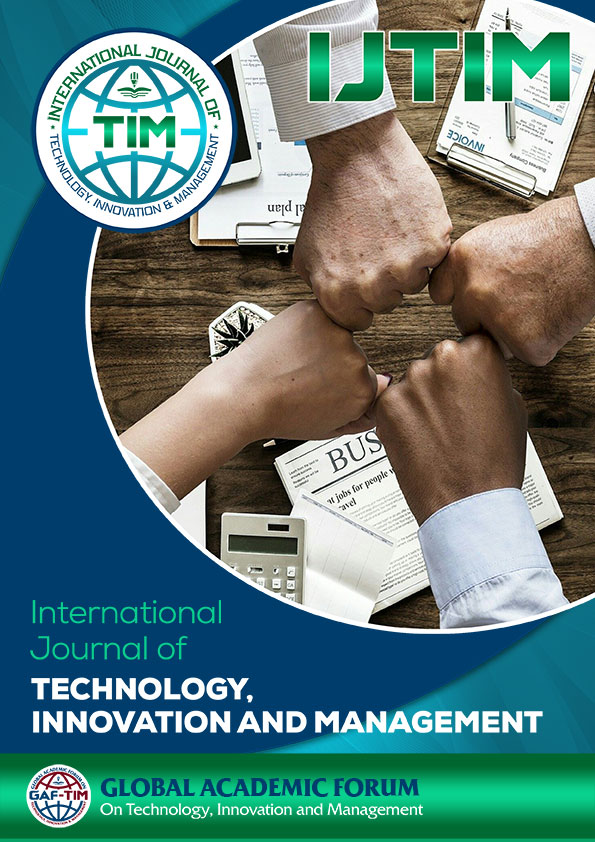The Reality of SMEs and Sustainable Development from the Perspective of Innovative Economic Vision of the Kingdom of Bahrain 2030
DOI:
https://doi.org/10.54489/ijtim.v3i1.194Keywords:
SMEs, Innovation, Management, Economic, SustainabilityAbstract
The study aimed to identify the reality of SMEs and the sustainability of their development from the perspective of innovation in light of the economic vision of the Kingdom of Bahrain 2030. The study used the descriptive analysis approach, based on the published reports of small and medium enterprises. In addition, the survey has been used to find out the size of the obstacles and challenges facing these small and medium enterprises in the Kingdom of Bahrain. The sample consists of 270 small and medium enterprises in the Kingdom of Bahrain as the population of this study was 829 company, were the data collected has been analyzed using the SPSS version 27. The study's findings highlight the significance of institutions' long-term viability and growth in light of their central function in the advancement of the economic development cycle. Another significant factor is the requirement for the company to grow and innovate in its operations, as well as the financial and marketing help that the state may provide as a partner in the economy's growth. Furthermore, Companies greatly contribute to the strategic and economic planning of governments due to their significant impact on the economy and involvement in it. In order to achieve the maximum levels of the economy, which in our day has become the most important priority, the researchers advised enhancing the activation of institutional processes and working toward the creation of creative and smart institutions crucial for nations, which in turn promotes the growth of entrepreneurship initiatives and their operations. Additionally, he exhorted small and medium-sized businesses to step up their support by investing in the creation of their cutting-edge goods in order to keep up with the market and achieve the goals of the Kingdom of Bahrain's Vision 2030.
References
Abdel Moneim, T., 2005. The effect of using the negotiating approach and the portfolio method in developing creative expression skills, and the attitude towards the subject among first year secondary students. J. Stud. Curricula Teach. Methods, 52, 222–234.
Akpoviroro, K.S., Oba-Adenuga, O.A., Akanmu, P.M., 2021. The role of business incubation in promoting entrepreneurship and SMEs development. Manag. Entrep. trends Dev. 2.
Alderhell, W., Hamad, G., 2021. The challenge of incubating sustainability in the Swedish innovation system.
Ara Shaikh, A., Kumar, A., Jani, K., Mitra, S., García-Tadeo, D.A., Devarajan, A., 2022. The Role of Machine Learning and Artificial Intelligence for making a Digital Classroom and its sustainable Impact on Education during Covid-19. Mater. Today Proc. 56, 3211–3215.
Ayad, T., Sobaih, A.E.E., Elshaer, I.A., 2022. University Incubator Support and Entrepreneurial Intention among Tourism Graduates: Mediating Role of Personal Attitude. Sustain. 14, 16045.
Ayatse, F.A., Kwahar, N., Iyortsuun, A.S., 2017. Business incubation process and firm performance: an empirical review. J. Glob. Entrep. Res. 7.
Azapagic, A., 2003. Systems Approach to Corporate Sustainability: A General Management Framework. Process Saf. Environ. Prot. Trans. Inst. Chem. Eng. Part B 81, 303–316.
Cecilia Igwemeka, E., Igwemeka, E., Chijindu, H., Chinyere, G., 2015. Foreign Investment and Its Effect on the Economic Growth in Nigeria: A Triangulation Analysis Academics View project Dynamics of inflation and manufacturing sector performance in Nigeria: Analysis of effect and causality View project Foreign Investment an. IOSR J. Econ. Financ. 6, 1–07.
Daub, C.-H., Hasler, M., Verkuil, A.H., Milow, U., 2020. Universities talk, students walk: promoting innovative sustainability projects. Int. J. Sustain. High. Educ. 21, 97– 111.
Famiola, M., Hartati, S., 2018. Entrepreneurship learning system in business incubators: An case study in Indonesia. Int. J. Eng. Technol. 7, 57–62.
Hackett, S.M., Dilts, D.M., 2004. A Systematic Review of Business Incubation Research. J. Technol. Transf. 29, 55–82.
Hernandez Chea, R., Carrà, G., 2016. A Conceptual Approach for Business Incubator Interdependencies and Sustainable Development. Agric. Agric. Sci. Procedia 8, 718–724.
Hibah, H., Alhakimi, W., 2021. The Role of Business Incubators in The Development of Entrepreneurship in Yemen. J. Impact 2, 54–70.
Hunitie, M.F., Saraireh, S., Al-Srehan, H.S., Al-Quran, A.Z., Alneimat, S., 2022. Ecotourism Intention in Jordan: The Role of Ecotourism Attitude, Ecotourism Interest, and Destination Image. Inf. Sci. Lett. An Int. J. 11, 1815–1822.
Kata, S.K., Kadhim, S.J., Zaboon, A.A., 2020. Business incubators and their role in supporting and developing small enterprises in Egypt and Algeria: A case study. Int. J. Innov. Creat. Chang. 78–99.
Keegan, B.J., Dennehy, D., Naudé, P., 2022. Implementing Artificial Intelligence in Traditional B2B Marketing Practices: An Activity Theory Perspective. Inf. Syst. Front.
Lesáková, L., 2012. The role of business incubators in supporting the SME start-up. Acta Polytech. Hungarica 9, 85–95.
Li, C., Ahmed, N., Qalati, S.A., Khan, A., Naz, S., 2020. Role of business incubators as a tool for entrepreneurship development: The mediating and moderating role of business start-up and government regulations. Sustain. 12, 1–23.
Meru, A.K., Struwig, M., 2011. An Evaluation of the Entrepreneurs’ Perception of Business-Incubation Services in Kenya. Int. J. Bus. Adm. 2.
Muriithi, S., 2018. Business Incubators : The Missing Link to Small Business Survival. Int. J. Humanit. Soc. Stud. 6, 201–209.
Oshewolo, S., 2010. Galloping poverty in Nigeria: An appraisal of government interventionist policies. J. Sustain. Dev. Africa 12, 264–274.
Peters, L., Rice, M., Sundararajan, M., 2004. The Role of Incubators in the Entrepreneurial Process. J. Technol. Transf. 29, 83–91.
Rifai, F., Sattar, A., Yousif, H., 2016. THE ROLE OF BUSINESS INCUBATORS IN THE SUCCESS OF ENTREPRENEUR
STARTUPS: A Field Study in the Jordanian Economy. Asian J. Bus. Manag. Sci. 4, 1–13.
Sanyal, S., Hisam, M., 2018. The Role of Business Incubators in Creating an Entrepreneurial Ecosystem: A Study of the Sultanate of Oman. Indian J. Commer. Manag. Stud. IX, 60–77.















